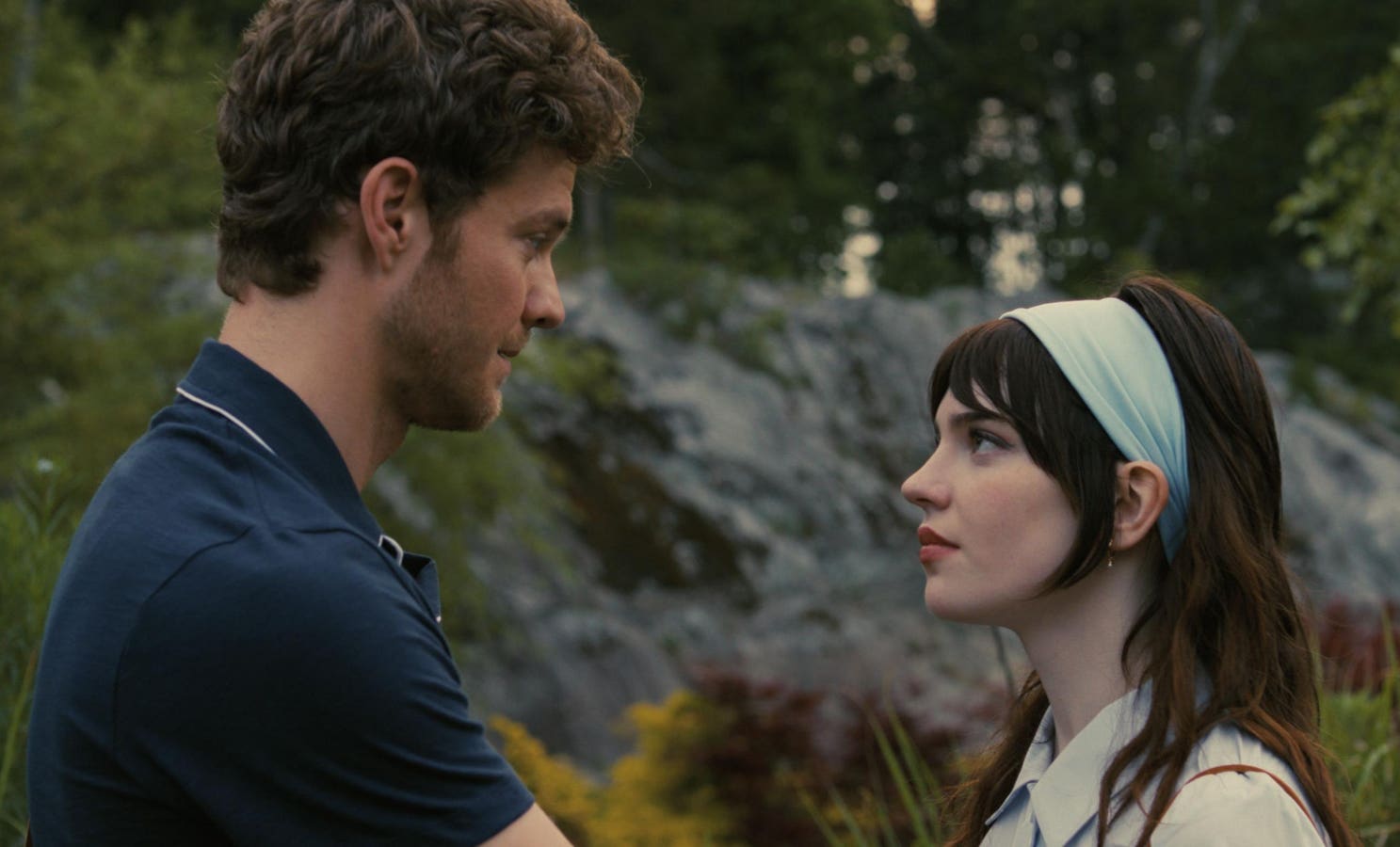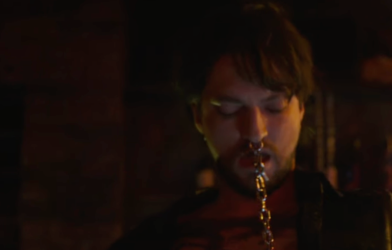(L-R) JACK QUAID as Josh and SOPHIE THATCHER as Iris in New Line Cinema’s “COMPANION,” a Warner … [+]
J. D. Lifshitz and Raphael “Rafi” Margules refuse to play it safe.
The pair of relative Hollywood newcomers behind the BoulderLight Pictures banner prefer to be “responsibly reckless” when it comes to the movies they choose to produce. “You want to make sure that the numbers make sense enough that you can go wild and really push the envelope and excite people,” says the former over Zoom.
“This business used to make trends and now it chases them,” Lifshitz continues. “We really want to make stuff that keeps you on your toes and gives you the best time you can have sober at the theater. [We want to give you] reasons to sit up, take note, and have a great time. Film is a populist medium and we work for the audience … We believe that audiences want to go to the movies. They just don’t go for the air conditioning anymore. You have to give them a reason.”
They’ve certainly done just that over the last five years with unexpected, yet totally original, projects like Becky (an R-rated riff on the Home Alone formula); The Vigil (a scary-good Jewish horror movie with predominantly Yiddish dialogue); and, perhaps most notable of all, Barbarian (BoulderLight’s first major studio release). Writer-director Zach Cregger’s Pulp Fiction-esque subversion of the horror genre and screenplay structure turned out to be a surprise hit, netting rave reviews and over $45 million worldwide against a minuscule budget of $4.5 million. The mostly indie-focused BoulderLight suddenly found itself catapulted into the industry stratosphere, pretty much overnight. In an age of multi-billion dollar superhero franchises and endlessly mined IP, BoulderLight had done the impossible: cut through all the noise with something new, something radical.
Four months after Barbarian’s theatrical debut in September 2022, the company inked a first-look deal with New Line Cinema, which promised to maintain their autonomy while giving them access to the resources one can only get from a global juggernaut like Warner Bros. “Their pitch to us was, ‘We don’t want to change what you guys do, we just want to help you scale,’” Lifshitz remembers. It was a perfect match, especially considering the fact that Lifshitz grew up admiring the films produced by New Line under the leadership of Bob Shaye and Mike De Luca (fitting enough, the latter now serves as Co-Chair and CEO of WB’s Motion Picture Group).
“Our two favorite studio tenures are [Robert Evans’ reign at] Paramount [from] ‘68 to ‘73 and New Line under De Luca in the ‘90s. We want to have that bond with our audience. We want to build something between a Blumhouse and a Castle Rock — and really have a brand that audiences can trust across genres … A big problem in the business today is people making movies for executives instead of audiences. And ultimately, that’s who we work for. That always needs to be the goal; giving them stuff that feels like it’s not homogenized. That it’s made by people.”
HOLLYWOOD, CALIFORNIA – JANUARY 27: Producer J.D. Lifshitz (L) and producer Raphael Margules attend … [+]
The first feature they submitted under the New Line arrangement was Companion (now playing in theaters nationwide), a wildly entertaining, darkly comedic, and deliciously clever mix between Black Mirror, a Coen brothers crime caper, and the cheeky tonal whiplash of Edgar Wright’s Cornetto trilogy. In other words, it fulfills BoulderLight’s goal of making what the producers call “premium pulp.”
Margules adds: “In a sense, it’s the broadest thing we’ve done and it feels like a movie you and your mom could both enjoy. People say they want original movies and this is that. We feel like this movie is fresh, original, funny, and fun. It kind of gives you everything you want on a Saturday night at the movies.”
As Lifshitz is quick to point out, “broad” isn’t necessarily a bad thing. “The Godfather was a broad, populist movie. Stanley Kubrick made movies for Warner Bros. Quentin Tarantino makes broad, populist movies, but they’re singular. All of our films are filmmaker-driven and yet, I think you see a thread in terms of what excites us … It’s a pursuit of truth, whether it’s Dumb & and Dumber or The Brutalist. A great movie is doing something with a level of authenticity, and that is the thing we really respond to. It doesn’t feel like you’re trying to approximate what people want, it feels like you’re trying to tell an honest story.”
Without giving too much away — this really is one of those experiences where you want to go in knowing as little as possible — Companion follows Iris (Sophie Thatcher), a jailbroken sex robot facing an existential crisis amidst a chaotic weekend getaway with her “boyfriend,” Josh (The Boys’ Jack Quaid) and his three friends: Kat (Never Have I Ever’s Megan Suri), Eli (What We Do in the Shadows’ Harvey Guillén), and Patrick (Smile 2’s Lukas Gage).
Originally envisioned as Cregger’s Barbarian follow-up before the filmmaker pivoted to the highly mysterious Weapons, Companion ultimately became the responsibility of its writer, directorial greenhorn Drew Hancock, whose screenplay is as tight and multilayered as they come. “When somebody’s a writer-director, it makes you feel very confident. It also gives you an opportunity for a real, singular experience,” Lifshitz explains. “Drew really birthed this thing. He’d lived with it for so long [and] had this image of what Iris was going to be and and how the film was going to play out … This really is the movie that Drew wanted to make.”
“We were able to see from the page that Drew is a singular voice through and through,” echoes Margules. “The way that he balances tone is pretty unbelievable. Obviously, Companion is an extremely funny movie, but the stakes are real. You don’t feel like you’re watching a horror-comedy. You’re watching a sci-fi mystery/crime thriller that has a ton of laughs. It’s such a difficult thing to do, and he pulled it off in the script and in the movie [itself].”
Boasting a near-perfect score of 94% on Rotten Tomatoes, Hancock’s self-assured debut marks the first great cinematic delight of 2025 and cements BoulderLight as one of the most exciting production outfits working in Hollywood today. Not only do they back refreshingly original stories from promising new talent, but they also know how to realize those stories in financially conservative fashion. Music to a studio’s ears. “We were really able to flourish and do our thing as an independent company within the studio system,” Margules says. “This was the case study and it really worked out nicely. It was a testament to the studio of what we could do.”
(L-R) JACK QUAID as Josh and SOPHIE THATCHER as Iris in New Line Cinema’s “COMPANION,” a Warner … [+]
Looking ahead BoulderLight has several projects on the horizon. Aside from Weapons, they’ve also got Friendship (A24 is set to release the comedy starring Paul Rudd and Tim Robinson); a remake of The Faculty (Hancock is penning the script); “a really grisly horror movie” set beneath the streets of Manhattan; “a really cool World War II thriller”; an adaptation of “a popular video game”; a horror movie in the world of a children’s television show”; a “big, broad studio comedy”; and a Jewish television series.
The “blue chip IP” they’d really love to get their hands on more than any other is A Nightmare on Elm Street, which originated at New Line, but is now split between rights holders. “There is no genre franchise that means more to me,” notes Lifshitz. “When I was a kid, I knew two directors’ names: Steven Spielberg and Wes Craven. [Elm Street] is the thing that I think you can turn into the next IT. If you do A Nightmare on Elm Street right — and I believe we would, God willing — it could be the highest-grossing horror movie of all time, without adjusting for inflation.”
Still, there’s no shortage of work to be done while they patiently wait for Mr. Krueger to become available. And as if to underscore the high level of storytelling they strive to meet on a regular basis, the office right next to BoulderLight’s on the Warner Bros. lot in Burbank is occupied by none other than the great Aaron Sorkin. “It’s very bizarre,” Lifshitz concludes. “It’s a very weird thing that we get to come to work and do this. Rafi and I walk around a lot, basically every day, just pinching ourselves. But at the same time, we really want to work and earn and deliver for our partners and for the audience.”
Companion is now playing in theaters everywhere. Get tickets here.









